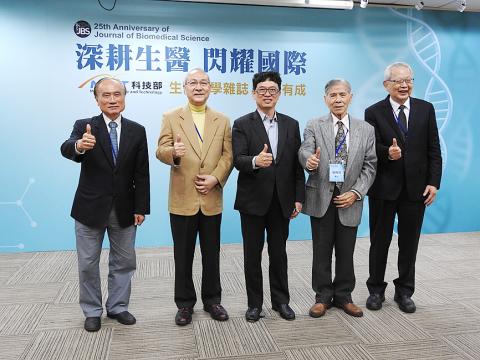Research and experimental medicine papers from Taiwan’s first English-language journal for biomedicine last year ranked as the most influential in Asia, the Ministry of Science and Technology said yesterday as the journal marks its 25th anniversary.
The ministry celebrated the anniversary of the Journal of Biomedical Science at a news conference in Taipei, which was attended by the journal’s current and former editors-in-chief.
The journal, launched by the ministry in January 1994, is the first international journal in biomedical science operated by a Taiwanese team, Deputy Minister of Science and Technology Shieh Dar-bin (謝達斌) said.

Photo courtesy of the Ministry of Science and Technology
Its impact factor, which reflects the yearly average number of citations its published articles received, rose from 0.99 in 1999 to 5.203 last year, Shieh said, citing information in the Journal Citation Reports (JCR) database released by the US Institute for Scientific Information earlier this year.
When the Journal of Biomedical Science first started publishing, only about three in every 100 submissions by Taiwanese researchers were accepted by international journals, said Chang Chuan-chiung (張傳炯), the journal’s founding editor-in-chief and Academia Sinica academician renowned for his research on snake venoms.
In research and experimental medicine, JCR ranked the Journal of Biomedical Science as No. 1 among 19 similar publications in Asia and 20th of 136 similar journals worldwide last year, said Chang Wen-chang (張文昌), its current editor-in-chief and chairman of Taipei Medical University’s board of trustees.
In cell biology, the journal was ranked fourth among 18 similar publications in Asia and 49th among 193 similar publications worldwide, he said, adding that the field is more competitive for studies involving both animal and plant cells.
The key to improving the Journal of Biomedical Science’s clout is to publish special issues on “trending topics” or subjects showcasing Taiwan’s research edge, such as enterovirus 71, dengue fever, hepatitis B, immunotherapy and neurodegenerative diseases, Chang Wen-chang said.
Over the past five years, the Journal of Biomedical Science had received 24 percent of submissions from China, 12 percent from India, 8 percent from Taiwan and 3 percent from the US, he said, adding that quality, not nationality, is the primary consideration for publication.
The journal is published by UK-based BioMed Central, part of global publisher Springer Nature, which helps it reach more readers in the US and Europe, he said.

Alain Robert, known as the "French Spider-Man," praised Alex Honnold as exceptionally well-prepared after the US climber completed a free solo ascent of Taipei 101 yesterday. Robert said Honnold's ascent of the 508m-tall skyscraper in just more than one-and-a-half hours without using safety ropes or equipment was a remarkable achievement. "This is my life," he said in an interview conducted in French, adding that he liked the feeling of being "on the edge of danger." The 63-year-old Frenchman climbed Taipei 101 using ropes in December 2004, taking about four hours to reach the top. On a one-to-10 scale of difficulty, Robert said Taipei 101

Nipah virus infection is to be officially listed as a category 5 notifiable infectious disease in Taiwan in March, while clinical treatment guidelines are being formulated, the Centers for Disease Control (CDC) said yesterday. With Nipah infections being reported in other countries and considering its relatively high fatality rate, the centers on Jan. 16 announced that it would be listed as a notifiable infectious disease to bolster the nation’s systematic early warning system and increase public awareness, the CDC said. Bangladesh reported four fatal cases last year in separate districts, with three linked to raw date palm sap consumption, CDC Epidemic Intelligence

Two Taiwanese prosecutors were questioned by Chinese security personnel at their hotel during a trip to China’s Henan Province this month, the Mainland Affairs Council (MAC) said yesterday. The officers had personal information on the prosecutors, including “when they were assigned to their posts, their work locations and job titles,” MAC Deputy Minister and spokesman Liang Wen-chieh (梁文傑) said. On top of asking about their agencies and positions, the officers also questioned the prosecutors about the Cross-Strait Joint Crime-Fighting and Judicial Mutual Assistance Agreement, a pact that serves as the framework for Taiwan-China cooperation on combating crime and providing judicial assistance, Liang

US climber Alex Honnold left Taiwan this morning a day after completing a free-solo ascent of Taipei 101, a feat that drew cheers from onlookers and gained widespread international attention. Honnold yesterday scaled the 101-story skyscraper without a rope or safety harness. The climb — the highest urban free-solo ascent ever attempted — took just more than 90 minutes and was streamed live on Netflix. It was covered by major international news outlets including CNN, the New York Times, the Guardian and the Wall Street Journal. As Honnold prepared to leave Taiwan today, he attracted a crowd when he and his wife, Sanni,